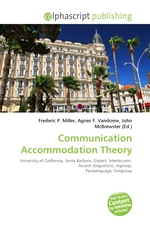Communication Accommodation Theory
Frederic P. Miller, Agnes F. Vandome, John McBrewster
бумажная книга
High Quality Content by WIKIPEDIA articles! The Communication Accommodation Theory (CAT) was developed by Howard Giles, professor of communication, at the University of California, Santa Barbara. CAT explains some of the cognitive reasons for code-switching and other changes in speech as individuals seek to emphasize or minimize the social differences between themselves and their interlocutors. Giles posits that when speakers seek approval in a social situation they are likely to converge their speech to that of their interlocutor. This can include, but is not limited to the language of choice, accent, dialect and paralinguistic features used in the interaction. In contrast to convergence, speakers may also engage in divergent speech. In divergent speech, individuals emphasize the social distance between themselves and their interlocutors by using linguistic features characteristic of their own group.
Данное издание не является оригинальным. Книга печатается по технологии принт-он-деманд после получения заказа.


